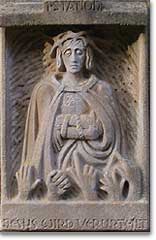 |
|
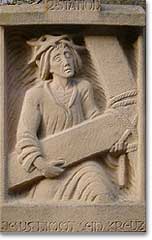 |
|
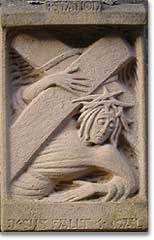 |
|
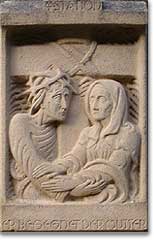 |
|
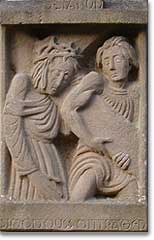 |
|
 |
|
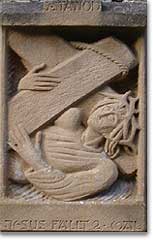 |
|
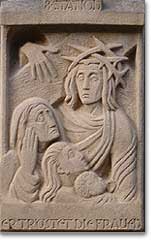 |
|
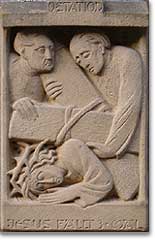 |
|
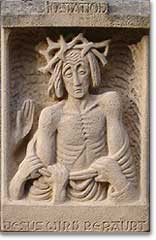 |
|
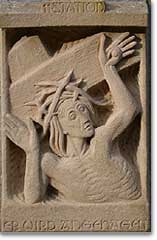 |
|
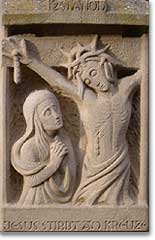 |
|
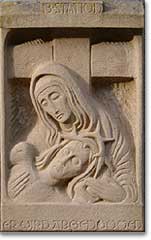 |
|
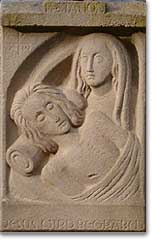 |
|
Via Crucis en el Santuario Original, Schoenstatt Stations of the Cross at the Original Shrine, Schoenstatt Kreuzweg am Urheiligtum, Schönstatt Fotos: Brehmİ 2005 |
|
|
ROME, Father Alberto Eronti,. Lent of the year 2005 will be recalled, at least by the Romans and a great part of the Catholic world, as a time that the Pope was constantly at the center of attention. John Paul II's health has been declining for some time, however the Pope has continuted working for the Church and the world without pause. Late Sunday the 13th, when the automobile that transported him when he left Policlinic Gemelli, the crowd - once more, as they had done just a few weeks ago - crowded the streets to greet "the man in white". There were multiple signs of affection: songs, chants, hands waving white handkerchiefs, crying...everything was a good way to show their love.
That night I received a telephone call from Valencia, Spain. The person who called had seen the Pope's return home on television. He asked me, "Listen, what does that man have, what does he have?, I was moved when I saw his fraility and the affection of the people.
What is it about him? I responded saying: in him they have the fulfillment of the words of Jesus: "When you lifted up the Son of Man, I will bring all towards me". This Pope has been attractive since the beginning. As soon as he was "elevated" to the Seat of Peter he occupied an enormous place in the sense of humanity. His ability to communicate, his trips, his gestures, his homilies, his speeches,
his messages and writings awaken dormant realities in the hearts of many men and women, the elderly and the youth. He occupied a singular place, Providence placed him in the center not only of the Church, but also on the world stage. His figure as pastor and teacher constituted him as an almost exclusive reference point, his moral authority was and is enormous. Now he must live what Jesus told
Peter at the edge of the sea of Tiberias: "Amen, amen, I say to thee when thou wast young thou didst gird thyself and walk where thou wouldst. But when thou art old thou wilt stretch forth thy hands, and another will gird thee, and lead thee where thou wouldst not.(Jn. 21,18)
Now this he said to signify (to Peter) by what manner of death he should glorify God."
Not a hidden pain, but as a participant of pain
These words are becoming a reality in the life of John Paul II. Many ask about the subject of his resignation. The Pope seems to have it very clear it isn't what the Spirit is indicating at this time, but - on the contrary - "he is allowing himself to be led" and "to give glory to God".
Precisely, now when he is impeded from physically moving freely, now that he cannot speak, now that he seems so frail, it when "he is feeling elevated and attracting many towards him". His preaching without words, his illness and his pain that is not hidden, but he is a a participant of pain, the dignity of his suffering and his extreme love, have constituted themselves in a more effective apostolate. Precisely at the time when the horror of violence and the suffering of many seems to have reached a awesome level, "this man" carries his cross "each day" and he constitutes himself in "brother and Father" of all who suffer. The ancient Romans used to say to their triumphant generals: "the glory of the world is transient". Yes, the glory of the world is transient, fame is transient; what does not pass and which remains is the glory of God and what God gives. This is the case!
Christ continues to walk with man
These days there is much talk about the Holy Week celebrations. The names of the Cardinals who will preside at each of the ceremonies at the Basilica at St. Peter's have been announced and it is said that the Pope will only impart the blessing of " to the city and the world" on the morning of Easter Sunday. At this time no one knows exactly what will happen. Without a doubt the Pope will not be able to speak nor celebrate the liturgies, but this will not keep him from presiding with his silent presence at each celebration. We know that he greatest desire is to be present at the Stations of the Cross on Good Friday at the Colosseum, with Cardinal J. Ratzinger in charge of the meditations. The doctors do not advise it, will John Paul II be physically absent? Nobody knows. What everyone knows is that he will not leave the cross of his suffering and the suffering for the world. Especially in this Holy Week, in which the "sign of Christ" who is the Pope, seems in the eyes of the world to be crucified. It is as if through his representative, Christ is telling mankind that he continues to walk with them, that he will never leave their side and especially if they are suffering.
"Love is stronger than death"
How should we celebrate this paschal mystery in the year 2005? How do we celebrate at a time in which we are so sensitive to the situation of suffering of so many millions of persons? At no time has there been so much pain, at least quantitavely, than in our time. In what way do we live, announce, celebrate resurrection today? In a simple way, respecting reality, discretely but profoundly, it could consist of telling each other on the Holy Night of Easter: "Jesus lives in spite of his real death. And he lives for eternity. He lives hidden in God, although present in the world through the Spirit. And he is now, with this life, the hope for the future of mankind. God is always Emmanuel that accompanies and guides".
For that reason we also believe that "Love is stronger than death" (Cant. 8,6) and that "love never dies: (1 Cor. 13, 8).
Bridge towards the Father
Only from God, the God of Love, can we discover that suffering, is the "cross of each day", it is not a punishment nor a misfortune. For Jesus the cross was a "bridge toward the Father". Nailed to the rock of Golgotha, the higher part of the cross rests on the breast of the Father (that is how it is depicted in some paintings and tableaus). The Son went towards the Father "raising himself" on the cross of suffering. This how we should understand the last words of the "suffering Man": "Father, into your hands I commend my spirit." (Lk. 23,46) He gives the Father his life as a Son! the response of the Father is Resurrection, that is to say: the Life of the Son.
"Now standing by the cross of Jesus was his Mother" (Jn. 19, 25) Perhaps it would be good to end this report with some phrases of this prayer of our Father and Founder: "The sacrifice she was allowed to make in you will sing forever in my soul...Ever since the second Eve gave you up to death, she understands all the sorrows of the heirs of Adam and takes care in her motherly way...May I always remain a faithful child of this
Mother, deeply inscribing her name into all hearts. Then the sorrows that afflict the nations will awaken a jubilant and resounding hymn of redemption." (Heavenwards, pp.86, 87). Amen!
From Rome, I wish you a happy and blessed Easter.
Translation: Celina M. Garza, Harlingen, TX, USA